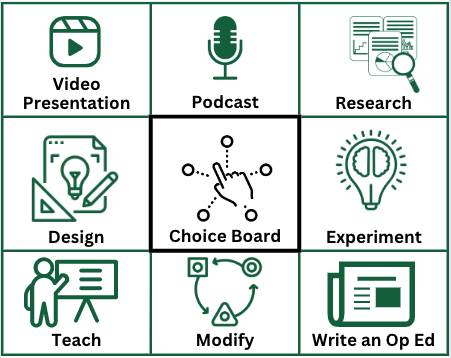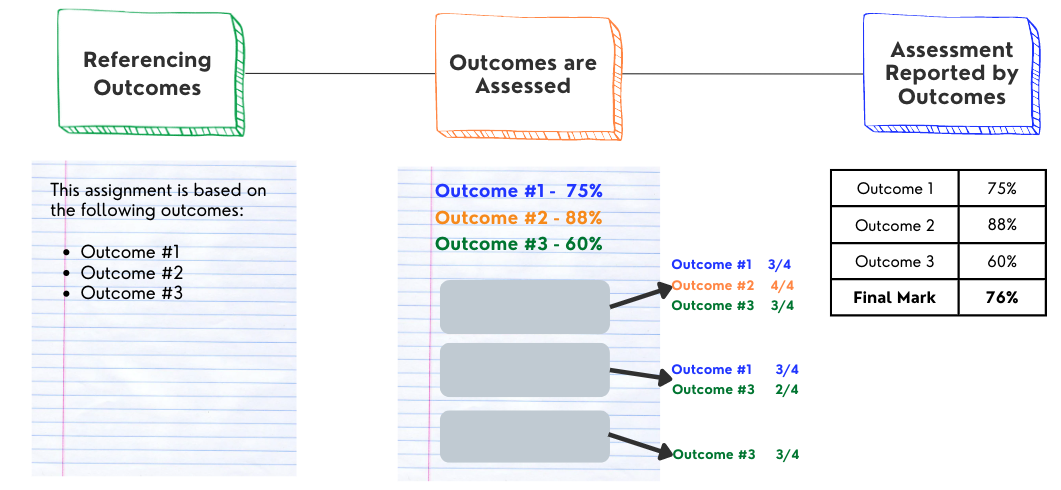While everyone agrees a grade is designed to represent what a student has learned, some educators also think grades should be used to motivate students. When our students seemed less inclined to attend or participate during and after the pandemic, we turned to something the grading literature does not support – giving a grade for being in class. Here’s a quick summary of what the research says on the subject of giving grades for participating (i.e., the 1-mark quiz) or attending:
| You might think |
What research says |
What experts recommend |
| Giving a small grade for attendance motivates students to come to class |
- You should include academic achievements, not behaviour, in your grades if you want them to represent what students have learned.
- Averaging in attendance allows some students with marginal understanding to pass through compliance rather than achievement.
- Many students who do not attend, do poorly but are not motivated to change their behaviour by their grades. They attribute the grade to a hard class or bad instruction, not themselves.
|
- Have students doing active, important learning activities in class that will be essential to doing well on major assessments. Students who know they are practicing key skills and getting feedback, largely choose to attend.
- Explain why attending is an expectation and an advantage.
- Increased belonging and relevance are much better predictors of high attendance than giving grades for it. Focus on helping students connect to each other and what you teach.
|
| Giving a grade for participation increases learning |
- Students may participate more, but they commonly agree with or repeat others’ ideas for the grade. You are grading compliance with expectations not learning.
- Students learn more if participation is not graded, as they are safer to make mistakes and seek feedback.
|
- Have a rubric for the quality of participation instead of tracking the number of times.
- Allow students to take many opportunities to demonstrate deep understanding, including in small groups or one on one with you.
|
| Oral participation isn’t good evidence of learning |
- The method we choose to assess students impacts how successfully they can demonstrate what they know, including both speaking or writing. Use a variety of methods, and delay grading where possible to improve learning.
- In some disciplines, the best evidence of learning is making a strong oral argument, and it is practiced often. In this case, it may be the most trustworthy evidence you can gather, provided you focus on the quality of that participation.
|
- Use clear rubrics for oral assessment that describe the qualities of a good response and not the frequency. Talking does not equal understanding.
- Have students practice participating without grades, commenting on elements of that participation that demonstrate the qualities you want.
- Reduce anxiety by letting students know what questions will be so they can prepare what they will say or by letting them demonstrate their skills in small groups or just with you.
|
Grading quality
Not clear what the distinction between frequency and quality is? Remember frequency is only focused on how often, and quality is focused on how well.
Frequency of participation observed during discussion
| Participates most classes |
Participates often |
Participates at least 3 times in the course |
Does not participate |
Quality of understanding observed during class discussion or in a discussion board
| Raises insightful ideas supported with evidence. Responds to the most significant ideas of others by extending them or refuting them. Uses questions to steer discussions to essential or underlying questions. |
Raises ideas clearly and elaborates on them. Can refute or respond to main themes in the ideas of others. May ask important questions for the group to consider or questions to help the group clarify. |
Agrees or disagrees with others by focusing on basic observations or very specific details. May repeat others. |
Makes statements or raises questions at times, but they don’t help extend or deepen the discussion. |



